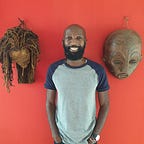Kinshasa- or how do you define happiness?
New Rochelle, New York, 11 December
So it’s been exactly three months since I left Kinshasa, the mythical capital of the country called the Democratic Republic of the Congo, formerly called Zaire, formerly called the Democratic Republic of the Congo (yes!), initially a private property of Belgian king, King Leopold The Second. Three months, after having lived in Kinshasa for seven years and four months, can be a tough change.
Leaving Kinshasa for another large, unequal city called New York has been easy. Kinshasa, I know everyone or of everyone (ok I am exaggerating a bit but you get the idea), New York, I know no one (besides a few United Nations staff); Kinshasa is a game of chess where I used to play both sides of the board, New York is a maze where I don’t even know where to start.
But it’s New York, he said, you can’t be unhappy here. I didn’t say I was unhappy, but the bigger question is why couldn’t I be unhappy here? Who died and made New York city paradise on earth?
I’ve lived in enough cities to know not to judge within three months (the famous 100 first days that politicians like to throw at us!). So it’s not about comparing Kinshasa to New York. Useless exercise. But I have to admit that I am fascinating by the idea of belonging, the idea of happily belonging somewhere, the idea of belonging happily somewhere. From N’Zebenou, the village where I was born in eastern Côte d’Ivoire to New York, via Conakry, Dakar, Geneva, Niamey, and many many other cities, how do you belong, when do you belong, why do you belong- if you belong?
Honestly the Kinshasa bashing, I can go on and on: electricity and water cuts are our daily bread; insecurity can be mind-boggling — my bag was stolen back in April while standing less than 20 meters away; our apartment, on the 4th floor, was broken into by a thief who came through the balcony. Yes, there is a lot of poverty, both economic and mental. And I could go on and on.
Then there’s “Kin la belle”- Kinshasa, the beautiful- as it used to be nicknamed: the sushi restaurants, the French, Belgian and Italian restaurants; the braised goat meat; the fish, the vegetables, the nightclubs and bars, the places where you can buy cigars, the music and the arts, the intelligent and smart men and women. These are all the things you can see. Then there is the abstract, the invisible. What the French call ce petit quelque chose, y a un truc — in English it translates into this little something that you can’t describe, you can’t put your finger on.
That’s the strength of these poor, what they call “unlivable/ least livable” cities. Their “livable cities” reports are based on rational criteria like transportation, schools, hospitals- and only God we would die for a bit of that in Kinshasa. But where are the reports that factor in the untouchable, the indescribable? The mystic? The spicy smell of the air? The way guys wear yellow pants like it was nothing? Yes, Vienna and The Hague are great, livable cities, but seriously can you compare the energy, the joie de vivre of Abidjan, Dakar or Lagos?
Yes, you will say everything is relative, I will say yes everything is relative- even relativity is relative.
So yes if you ask me if I miss Kinshasa, most definitely yes! My house and the two women I left in it; the artists, the heat, my neighborhood. The list is long.
New York is a great city- but Kinshasa is home!
The end.
[ And I would like to leave you with this quote that I picked up earlier this year. ]
